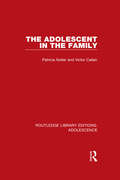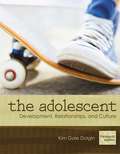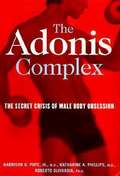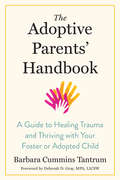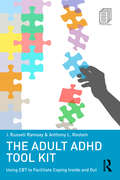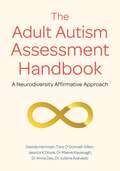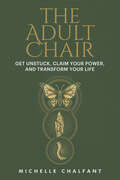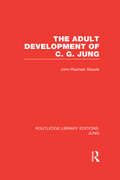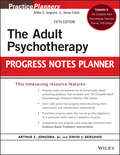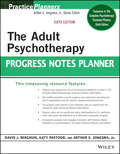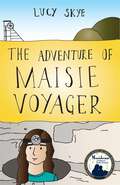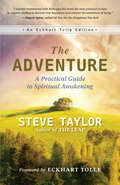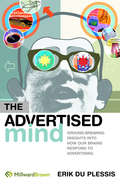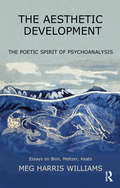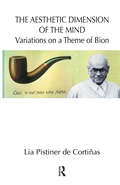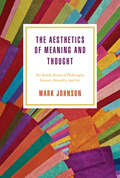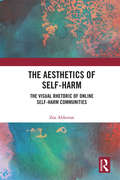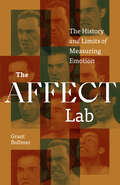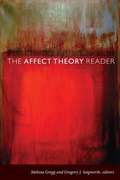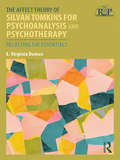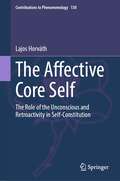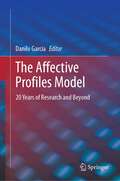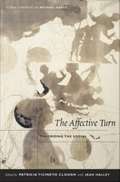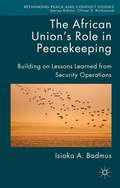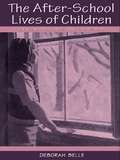- Table View
- List View
The Adolescent in the Family (Routledge Library Editions: Adolescence #7)
by Patricia Noller Victor CallanAdolescence can be a difficult time for all concerned. Issues such as high youth unemployment, sexual behaviour and drug abuse have made it a matter of great concern for the community at large, whether as parents, politicians or those working with adolescents in education and welfare. In addition, many parents fear that these problems could affect their own families. Originally published in 1991, the authors explore the complex needs of adolescents emphasising the importance of the family environment in helping adolescents cope with the many difficulties and changes they face during this period of their lives. The central theme is that adolescents, through conflict and negotiation, establish new but different relationships with their parents, relationships that can endure for a lifetime. The authors provide wide coverage of the key issues of adolescence, such as identity, separation from the family, and conflict, and look closely at the difficulties produced by events such as the divorce and re-marriage of parents, and social problems such as long-term unemployment. With its positive approach to the family and adolescents, this clear, concise and helpful book will be invaluable both to parents and to the many professionals whose work involves them with adolescents.
The Adolescent: Development, Relationships, and Culture (13th edition)
by Kim Gale DolginThe book is as comprehensive as possible within the confines of one text. The adolescent is discussed within the context of contemporary society. Material includes both theory and life experiences of adolescents and discusses physical, intellectual, emotional, psychosexual, social, familial, educational, and vocational aspects of adolescent development and behavior. It also reviews psychosocial problems of adolescents.
The Adonis Complex: The Secret Crisis of Male Body Obsession
by Jr. Harrison G. Pope Katharine A. Phillips Roberto OlivardiaDiscusses the growing numbers of men who are taking the quest for perfect muscles, skin, and hair too far, crossing the line from normal interest to pathological obsession.
The Adoptive Parents' Handbook: A Guide to Healing Trauma and Thriving with Your Foster or Adopted Child
by Barbara TantrumThe essential guide to parenting adopted and foster kids--learn to create felt safety, heal attachment trauma, and navigate challenging behaviors and triggersChildren who have been adopted and/or shuttled through the foster-care system experience trauma at a much higher rate than other kids, which can make it difficult for them to trust, relax, regulate their emotions, and connect with their new families. As a parent, learning how to heal attachment trauma, attune to your child's needs, identify triggers, and create felt safety is essential to providing the loving, supportive, and stable home they need to thrive.Written for parents of adopted and foster kids of all ages, this book offers resources for handling common concerns like sleep issues, food sensitivities, anger, fear, and reactivity. It also provides guidance on navigating transracial adoptions, working through parents' own hang-ups, and recognizing signs of developmental and psychological conditions. The book highlights practical strategies and provides real-life examples to address questions like: • How do I help my adopted child adjust? • Is this kind of behavior "normal"? • How do I help my child live, heal, and thrive with PTSD?
The Adult ADHD Tool Kit: Using CBT to Facilitate Coping Inside and Out
by J. Russell Ramsay Anthony L. RostainA central source of frustration for most adults with ADHD is that they know what they need to do but they have difficulties turning their intentions into actions. These difficulties also interfere with their ability to use self-help books and to get the most out of psychosocial treatments that provide coping strategies that promise to improve their functioning. Drs. Ramsay and Rostain are experts in the assessment and treatment of adult ADHD and are leaders in the development of effective psychosocial treatments for this group of patients. Their newest book, The Adult ADHD Tool Kit: Using CBT to Facilitate Coping Inside and Out is a coping guide for adults living with ADHD, one that does not just present useful coping strategies but also provides specific tactics designed to help readers implement these skills in their daily lives and brings them to life in a user-friendly format. The authors discuss many different settings in which ADHD may cause difficulties, including work, school, matters of physical health and well-being, and the issue of excessive use of technology. Although written for consumers, clinicians will find the book to be a clinically useful tool for their adult patients with ADHD, serving as a companion to the newly updated and expanded second edition of Drs. Ramsay and Rostain’s professional treatment manual, Cognitive-Behavioral Therapy for Adult ADHD: An Integrative Psychosocial and Medical Approach.
The Adult Autism Assessment Handbook: A Neurodiversity Affirmative Approach
by Davida Hartman Tara O'Donnell-Killen Jessica K Doyle Dr Maeve Kavanagh Dr Anna Day Dr Juliana AzevedoAdult autism assessment is a new and fast-growing clinical area, for which professionals often feel ill-equipped. Autistic adults are often misdiagnosed which has enormous implications for their mental health.This accessible and comprehensive adult autism assessment handbook covers the most up to date research and best practice around adult autism assessment, centering the person's internal experiences and sense-making in clinical assessment, rather than subjective observation, thus providing the clinician with a truly paradigm shifting Neuro-Affirmative approach to autism assessment. Traditional clinical assessment tools are comprehensively explored and unpacked to enable the clinician to have full confidence in aligning traditional criteria to the Autistic person's subjective experiences.Full of additional resources like language guidelines and an exploration of the common intersections between Autistic experience and the effects of trauma, mental health and more, this book supplies a breadth of knowledge on key areas that affect Autistic adults in everyday life.The mixed team of neurotypical and neurodivergent authors describe lived experience of Autistic adults, a how-to for conducting Neuro-Affirmative assessments and post-assessment support, alongside reflections from practice. This book also has a directory of further resources including downloadable forms that you can use to prepare for your own assessments and a downloadable deep dive into Autistic perception. This guide will also support professionals through every step of the assessment process.
The Adult Chair: Get Unstuck, Claim Your Power, and Transform Your Life
by Michelle ChalfantIt&’s time to find your power, learn how to love yourself, and break free of the limiting patterns and beliefs that are keeping you stuck—from the therapist behind the popular podcast The Michelle Chalfant Show.&“An excellent &‘how to act like an adult&’ manual that would assist anyone looking to shelve self-doubt, handle triggers, relinquish grudges, and learn self-compassion.&”—Library Journal (starred review)Many of us were never shown what it truly means to be an adult. Instead, we learned unhealthy patterns from parents who, themselves, had never been taught. It is no surprise that we often find ourselves filled with self-doubt, stuck in feelings of overwhelm, and trapped in unfulfilling or dead-end relationships. But there is a way out.After decades of working with clients, therapist, coach, and podcast host Michelle Chalfant passionately believes in the potential for every person to awaken to their true selves and create a life filled with purpose and joy. Her Adult Chair model fuses spirituality and psychology, making complex concepts accessible and practical. The Adult Chair explores the three key stages of human development using a framework of three chairs: &“The Child Chair,&” &“The Adolescent Chair,&” and &“The Adult Chair.&” By understanding and working through each stage, you&’ll identify how your early life experiences shaped your thoughts, behaviors, and self-worth. This insight alone is powerful, but Chalfant&’s five pillars of healthy adult living also provide simple, practical tools to help you permanently release the negative beliefs and behaviors holding you back.This is the manual we all needed while growing up, and it&’s not too late to learn from it now—a way to grow into adults who feel worthy, empowered, lovable, and confident. No matter what you want help with, The Adult Chair is your path to self-discovery, healing, and personal transformation.
The Adult Development of C.G. Jung (Routledge Library Editions: Jung)
by John-Raphael StaudeOriginally published in 1981, this study presents Jung’s theory of adult personality development, and analyses and interprets in its biographical and historical context the genesis and development of Jung’s theory of the individuation process. Dr Staude argues that an in-depth study of Jung’s life offers insights into the patterns and processes of adult development, and he focuses particularly on Jung’s writings during and immediately after his mid-life transition. He shows how Jung articulated his hard-won insights into adult development in his books and essays and into his analytic practice, and considers how Jung’s developmental theory relates to the changes he experienced in his own life and in his socio-historical environment. Dr Staude concludes that Jung’s emphasis on impersonal universals of human psychic development complements and supplements the personal emphasis of ego development theory and provides the foundations for a more holistic understanding of adult developmental psychology.
The Adult Psychotherapy Progress Notes Planner
by Arthur E. Jongsma Jr. David J. BerghuisSave hours of time-consuming paperwork with the bestselling treatment planning system The Adult Psychotherapy Progress Notes Planner, Fifth Edition contains complete prewritten session and patient presentation descriptions for each behavioral problem in The Complete Adult Psychotherapy Treatment Planner, Fifth Edition. The prewritten progress notes can be easily and quickly adapted to fit a particular client need or treatment situation. Saves you hours of time-consuming paperwork, yet offers the freedom to develop customized progress notes Organized around 43 behaviorally based presenting problems, including depression, intimate relationship conflicts, chronic pain, anxiety, substance abuse, borderline personality, and more Features over 1,000 prewritten progress notes (summarizing patient presentation, themes of session, and treatment delivered) Provides an array of treatment approaches that correspond with the behavioral problems and DSM-5(tm) diagnostic categories in The Complete Adult Psychotherapy Treatment Planner, Fifth Edition Offers sample progress notes that conform to the requirements of most third-party payors and accrediting agencies, including CARF, The Joint Commission (TJC), COA, and the NCQA Identifies the latest evidence-based care treatments with treatment language following specific guidelines set by managed care and accrediting agencies
The Adult Psychotherapy Progress Notes Planner (PracticePlanners #299)
by Arthur E. Jongsma Jr. David J. Berghuis Katherine PastoorReduce paperwork and increase efficiency with this indispensable companion to the Complete Adult Psychotherapy Treatment Planner, Sixth Edition The newly revised sixth edition of The Adult Psychotherapy Progress Notes Planner, delivers complete prewritten session and patient presentation descriptions for each behavioral problem described in the Complete Adult Psychotherapy Treatment Planner, Sixth Edition. These prewritten progress notes can easily be adapted to fit a particular client need or treatment situation. The Progress Notes Planner will save you hours of time-consuming paperwork while allowing you to retain the flexibility you need to adapt your notes to each individual patient. The Planner is organized around the 44 behaviorally based problems found in the sixth edition of the Complete Adult Psychotherapy Treatment Planner, including depression, chronic pain, anxiety, and more. The Progress Notes Planner identifies the latest evidence-based treatment clinical interventions with language that satisfies the requirements of managed care and accrediting agencies, like CARF, TJC, COA, and the NCQA. The Progress Notes Planner also offers: Over 1000 prewritten progress notes summarizing patient presentation, the themes of the session, and the treatment delivered by the psychotherapist An array of treatment approaches that correspond to the behavioral problems and DSM-V diagnostic categories in Complete Adult Psychotherapy Treatment Planner, Sixth Edition An additional chapter designed to coordinate with the Treatment Planner chapter on loneliness Full coordination with the sixth edition of the Treatment Planner Perfect for any professional who performs psychotherapy with the Complete Adult Psychotherapy Treatment Planner, Sixth Edition, the sixth edition of The Adult Psychotherapy Progress Notes Planner will also earn a place on the bookshelves of professors and students of psychotherapy programs and courses, as well as any university or private professional school that trains counselors or psychotherapists.
The Adventure of Maisie Voyager
by Lucy SkyeMaisie Voyager used to explore the world with her parents. She now lives in a tall town house with Aunt Hetty, experiencing 'normal' life. But strangers start appearing, cryptic messages are left, and Aunt Hetty is kidnapped! Following a trail of clues that leads her to abandoned tin mines and a hunt for treasure, Maisie discovers that evil Dr Gallows and his gang have taken her family hostage and it's up to her to save them. Facing many challenges along the way including sinister strangers, cold dark tunnels and the colour purple, Maisie has a big adventure ahead of her with big decisions to make. Suitable for children aged 9+ this captivating novel is a great read and offers a positive heroine with a unique outlook on life that all children will relate to, especially those on the autism spectrum.
The Adventure: A Practical Guide to Spiritual Awakening (An Eckhart Tolle Edition)
by Steve TaylorStep-by-step practices for cultivating spiritual awakening, from a renowned spiritual psychologist who has studied the phenomenon in hundreds of people and experienced it himself Steve Taylor has devoted his life to investigating spiritual awakening. In his books The Leap and Extraordinary Awakenings, he discussed case histories of dozens of people who experienced profound shifts in consciousness. The Adventure draws on this groundbreaking research, together with Taylor’s own awakening experiences, to offer guided meditations, contemplative exercises, and other practices for catalyzing spiritual transformation, as well as lyric poems and inspirational stories. The Adventure outlines how to: • recognize and cultivate the eight defining characteristics of wakefulness, including presence, acceptance, gratitude, and disidentification from the ego • expand awareness and quiet the mind through meditations and practical exercises • transcend our normal “sleep” state and the “thought mind” to move toward increasing heights and depths of spiritual awakening • use the challenges of everyday life — of home, workplace, and relationships — as doorways to enlightenment
The Advertised Mind: Groundbreaking Insights into How Our Brains Respond to Advertising
by Erik Du PlessisAdvertising research organizations have been trying for years to measure the effectiveness of advertising.The Advertised Mind draws on the very latest research into the workings of the human brain undertaken by psychologists, neurologists and artificial intelligence specialists. Author Erik du Plessis uses this research to suggest why emotion is such an important factor in establishing a firm memory of an advertisement and predisposing consumers to buy the brand that is being advertised.He also draws on the findings of Adtrack's world-famous database of responses to over 30,000 TV commercials (the largest in the world). He explores what "ad-liking" really means, and suggests how this paradigm about the role of emotion has resulted in a continued effort to obtain maximum return from advertising spend.
The Aesthetic Development: The Poetic Spirit of Psychoanalysis: Essays on Bion, Meltzer, Keats (The\harris Meltzer Trust Ser.)
by Meg Harris Williams'Few people would be better qualified than the author to write this innovative and eagerly anticipated post-Kleinian book. Deeply versed in the opus of Bion and Meltzer, the author enhances the concept of "catastrophic change". The analyst who "eschews memory and desire" observes the subtle interplay of transference and countertransference (Meltzer's "counter dreaming") as it works through aesthetic conflicts. The ensuing reciprocity of the patients and analysts unconscious is revealed as the aesthetical and ethical basis of psychoanalysis. In that sense the psychoanalytical process parallels that of poetic and artistic inspiration. They are all generated by creative internal objects. Harris Williams' intellectual tour de force demonstrates convincingly the human capacity for symbolic thinking that underlies literary, artistic and psychoanalytic creativity. Her encyclopaedic understanding of literature, art and psychoanalysis contributes to this book's virtuosity.'- Irene Freeden, Senior Member of the British Association of Psychotherapists
The Aesthetic Dimension of the Mind: Variations on a Theme of Bion
by Lia Pistiner de Cortinas'In this magisterial work, the author almost encyclopaedically reviews all of Bion's works and does so from the perspective (vertex) of the aesthetic dimension. She scans virtually all the essential elements of Bion's contributions and then details them at length, giving unusual clarifications as she does so..'This work constitutes an outstanding piece of Bion scholarship and interpretation. One comes away from it with a deep appreciation for the authors dreaming of Bion's work and for the light she has shined on many of Bion's more recondite themes.'- James Grotstein MD, Professor of Psychiatry, UCLA School of Medicine, from his Preface
The Aesthetics of Meaning and Thought: The Bodily Roots of Philosophy, Science, Morality, and Art
by Mark JohnsonAll too often, we think of our minds and bodies separately. The reality couldn’t be more different: the fundamental fact about our mind is that it is embodied. We have a deep visceral, emotional, and qualitative relationship to the world—and any scientifically and philosophically satisfactory view of the mind must take into account the ways that cognition, meaning, language, action, and values are grounded in and shaped by that embodiment. This book gathers the best of philosopher Mark Johnson’s essays addressing questions of our embodiment as they deal with aesthetics—which, he argues, we need to rethink so that it takes into account the central role of body-based meaning. Viewed that way, the arts can give us profound insights into the processes of meaning making that underlie our conceptual systems and cultural practices. Johnson shows how our embodiment shapes our philosophy, science, morality, and art; what emerges is a view of humans as aesthetic, meaning-making creatures who draw on their deepest physical processes to make sense of the world around them.
The Aesthetics of Self-Harm: The Visual Rhetoric of Online Self-Harm Communities
by Zoe AldertonThe Aesthetics of Self-Harm presents a new approach to understanding parasuicidal behaviour, based upon an examination of online communities that promote performances of self-harm in the pursuit of an idealised beauty. The book considers how online communities provide a significant level of support for self-harmers and focuses on relevant case studies to establish a new model for the comprehension of the online supportive community. To do so, Alderton explores discussions of self-harm and disordered eating on social networks. She examines aesthetic trends that contextualise harmful behavior and help people to perform feelings of sadness and vulnerability online. Alderton argues that the traditional understanding of self-violence through medical discourse is important, but that it misses vital elements of human group activity and the motivating forces of visual imagery. Covering psychiatry and psychology, rhetoric and sociology, this book provides essential reading for psychologists, sociologists and anthropologists exploring group dynamics and ritual, and rhetoricians who are concerned with the communicative powers of images. It should also be of great interest to medical professionals dealing with self-harming patients.
The Affect Lab: The History and Limits of Measuring Emotion
by Grant BollmerExamines how our understanding of emotion is shaped by the devices we use to measure it Since the late nineteenth century, psychologists have used technological forms of media to measure and analyze emotion. In The Affect Lab, Grant Bollmer examines the use of measurement tools such as electrical shocks, photography, video, and the electroencephalograph to argue that research on emotions has confused the physiology of emotion with the tools that define its inscription. Bollmer shows that the psychological definitions of emotion have long been directly shaped by the physical qualities of the devices used in laboratory research. To investigate these devices, The Affect Lab examines four technologies related to the history of psychology in North America: spiritualist toys at Harvard University, serial photography in early American psychological laboratories, experiments on &“psychopaths&” performed with an instrument called an Offner Dynograph, and the development of the &“electropsychometer,&” or &“E-Meter,&” by Volney Mathison and L. Ron Hubbard. Challenging the large body of humanities research surrounding affect theory, The Affect Lab identifies an understudied problem in formulations of affect: how affect is a construction inseparable from the techniques and devices used to identify and measure it. Ultimately, Bollmer offers a new critique of affect and affect theory, demonstrating how deferrals to psychology and neuroscience in contemporary theory and philosophy neglect the material of experimental, scientific research. Retail e-book files for this title are screen-reader friendly with images accompanied by short alt text and/or extended descriptions.
The Affect Theory Reader
by Melissa Gregg Gregory J. SeigworthThis field-defining collection consolidates and builds momentum in the burgeoning area of affect studies.
The Affect Theory of Silvan Tomkins for Psychoanalysis and Psychotherapy: Recasting the Essentials (Relational Perspectives Book Series)
by E. Virginia DemosThe Affect Theory of Silvan Tomkins for Psychoanalysis and Psychotherapy explores central issues in current clinical work, using the theories put forward by Silvan Tomkins and presenting them in detail, as well as integrating them with the most up-to-date neuroscience findings and infancy research, all based on a biopsychosocial, dynamic systems approach.Part I describes the essentials of life, based on our evolutionary and biological heritage, namely a need for a coherent understanding of one’s world and the capacity to act in that world; the infant's capacities are described in detail as embodying both. Longitudinal data is provided beginning at birth into the third year of life. Part II reviews current debates in psychoanalysis relating to motivation, and the lack of an internally consistent theory. Recent neuroscience findings are presented, which both negate drive theory, and support Tomkins' theory. His theory is then described in detail. In Part III, two case histories are presented: one is a clinical case illustrating one of Tomkins' affect powered scripts. The second case is drawn from a longitudinal study extending from birth, into early adulthood, which is made sense of with the help of Tomkins' theory. Demos concludes with a look at competing approaches to theory and responds to recent cognitive-based attempts to disprove both Tomkins' work and the latest findings from neuroscience. The Affect Theory of Silvan Tomkins for Psychoanalysis and Psychotherapy will appeal to psychoanalysts and psychoanalytic psychotherapists, as well as psychiatrists, psychologists, social workers, and psychiatric nurses.
The Affective Core Self: The Role of the Unconscious and Retroactivity in Self-Constitution (Contributions to Phenomenology #130)
by Lajos HorváthThis book extends the contemporary concept of the minimal self by introducing the affective core self. The overall aim is to integrate certain psychoanalytical ideas into the phenomenological investigation of passivity and reformulate the idea of the phenomenological unconscious. This volume contributes to the multidimensional analysis of the self by positioning the affective core self between the layers of the more minimal and the less minimal self. It underscores the importance of the unconscious in the constitution of the affective core self by providing the comparative analysis of the phenomenological and the psychoanalytical unconscious.Furthermore, comparisons are drawn between Freud’s conception of the afterwardsness of trauma and the phenomenological notion of retroactive sense-constitution. The book concludes that retroactive sense-making is a double-sided phenomenon and differentiates between implicit-bodily and conscious-narrative retroactive sense-constitution. In order to bolster the idea of implicit-bodily sense-constitution the volume also examines and utilizes contemporary insights on the nature of body memory. The conclusion claims that the affective core self is constituted in time by means of the underlying processes of the two-sided retroactive sense-constitution. This text appeals to students and researchers working in phenomenology and philosophy of mind.
The Affective Profiles Model: 20 Years of Research and Beyond
by Danilo GarciaThis timely volume provides an up-to-date exploration of the affective profiles model, a person-centered means of understanding the affective system. It presents the etiology underpinning the affective system and compares the model with other existing personality models, such as the Big Five Model, and the Cloninger’s Biopsychosocial Model. Most important, it examines the affective profiles model in relation to well-being, which includes life satisfaction, as well as psycho-logical health. As such, it illuminates the problems of depression, anxiety, and sleep disorders. Based on a wealth of longitudinal, cross-cultural and intervention studies, this book offers a critical view of the affective profiles model that will enrich both further research and clinical practice.
The Affective Turn: Theorizing the Social
by Patricia Ticineto Clough Jean Halley"The innovative essays in this volume . . . demonstrat[e] the potential of the perspective of the affects in a wide range of fields and with a variety of methodological approaches. Some of the essays . . . use fieldwork to investigate the functions of affects--among organized sex workers, health care workers, and in the modeling industry. Others employ the discourses of microbiology, thermodynamics, information sciences, and cinema studies to rethink the body and the affects in terms of technology. Still others explore the affects of trauma in the context of immigration and war. And throughout all the essays run serious theoretical reflections on the powers of the affects and the political possibilities they pose for research and practice. "--Michael Hardt, from the foreword In the mid-1990s, scholars turned their attention toward the ways that ongoing political, economic, and cultural transformations were changing the realm of the social, specifically that aspect of it described by the notion of affect: pre-individual bodily forces, linked to autonomic responses, which augment or diminish a body's capacity to act or engage with others. This "affective turn" and the new configurations of bodies, technology, and matter that it reveals, is the subject of this collection of essays. Scholars based in sociology, cultural studies, science studies, and women's studies illuminate the movement in thought from a psychoanalytically informed criticism of subject identity, representation, and trauma to an engagement with information and affect; from a privileging of the organic body to an exploration of nonorganic life; and from the presumption of equilibrium-seeking closed systems to an engagement with the complexity of open systems under far-from-equilibrium conditions. Taken together, these essays suggest that attending to the affective turn is necessary to theorizing the social. Contributors. Jamie "Skye" Bianco, Grace M. Cho, Patricia Ticineto Clough, Melissa Ditmore, Ariel Ducey, Deborah Gambs, Karen Wendy Gilbert, Greg Goldberg, Jean Halley, Hosu Kim, David Staples, Craig Willse , Elizabeth Wissinger , Jonathan R. Wynn
The African Union’s Role in Peacekeeping
by Isiaka A. BadmusThis study examines the African Union's peacekeeping role in managing African conflicts. Based on a qualitative research methodology, it analyses AU peace operations in Burundi and Somalia, and hybrid peacekeeping in Darfur, in order to identify the lessons learned and suggest how future outcomes may be improved.
The After-school Lives of Children: Alone and With Others While Parents Work
by Deborah BelleBased on research about after-school experiences and dilemmas conducted over a four-year period with employed parents and their children, this book draws on the stories these parents and children told--often using their actual words--to emphasize the wide variety of children's after-school arrangements, children's movement over time in and out of different arrangements, and the importance to children of multiple facets of their after-school arrangements, not simply the presence or absence of an adult caretaker. The book also emphasizes that children are not randomly assigned to after-school arrangements. Rather, parents and children struggle to reach optimal solutions to what are often difficult child care dilemmas. To understand these dilemmas, and the diverse strategies that families adopt, one must attend to the individual situations of children as family members understand them. This book was written to contribute to the development of new family and work policies and practices by illuminating the difficulties families face and their consequences for children. Written for psychologists, sociologists, and other social scientists who study families, maternal employment, child care, or child development, it will also be useful for parents, educators, community leaders, and public policymakers concerned about the well being of children whose parents are employed.
